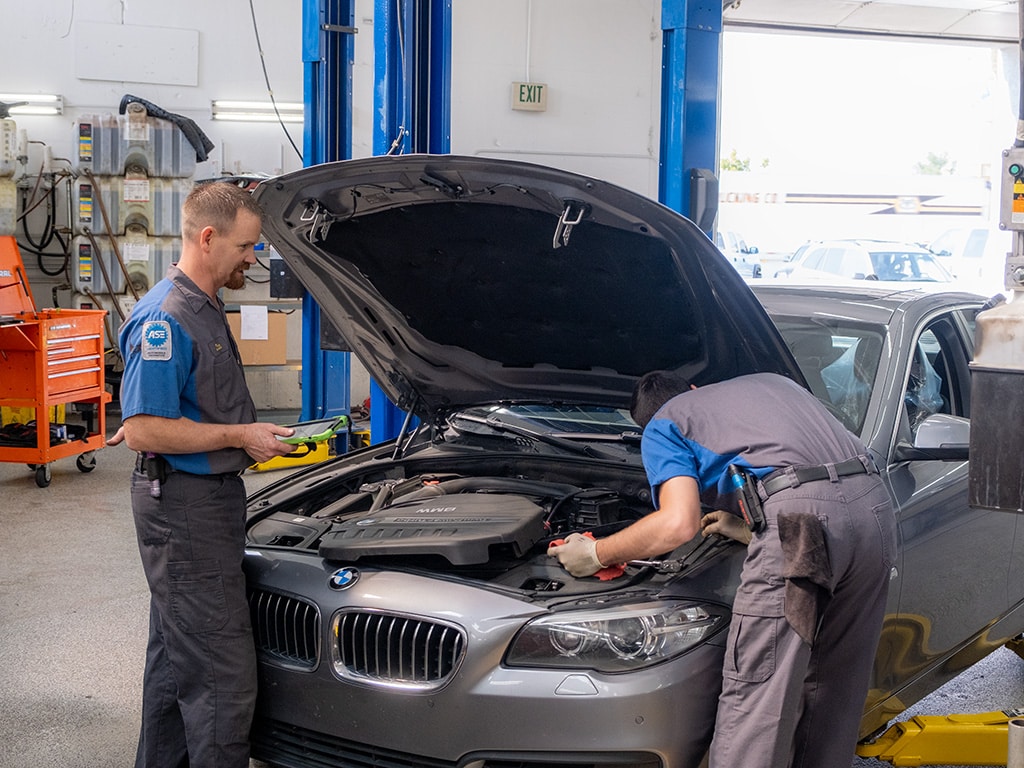
BMW


WE ARE YOUR BMW SPECIALIST
We are your BMW specialists! Our shop foreman Tyler started his career over 20 years ago by going through the BMW’s factory training. He then spent the majority of his career working for the only BMW dealer in Utah. He left the BMW dealer to go work with his mentor at a European specialist independent shop where he was able to broaden his knowledge on all BMW repairs as well as most other European-based makes. We were lucky enough to add Tyler to our team of technicians back in 2016. We were already known in our area for our expertise in all BMW makes, but the addition of Tyler has brought us to the highest level.

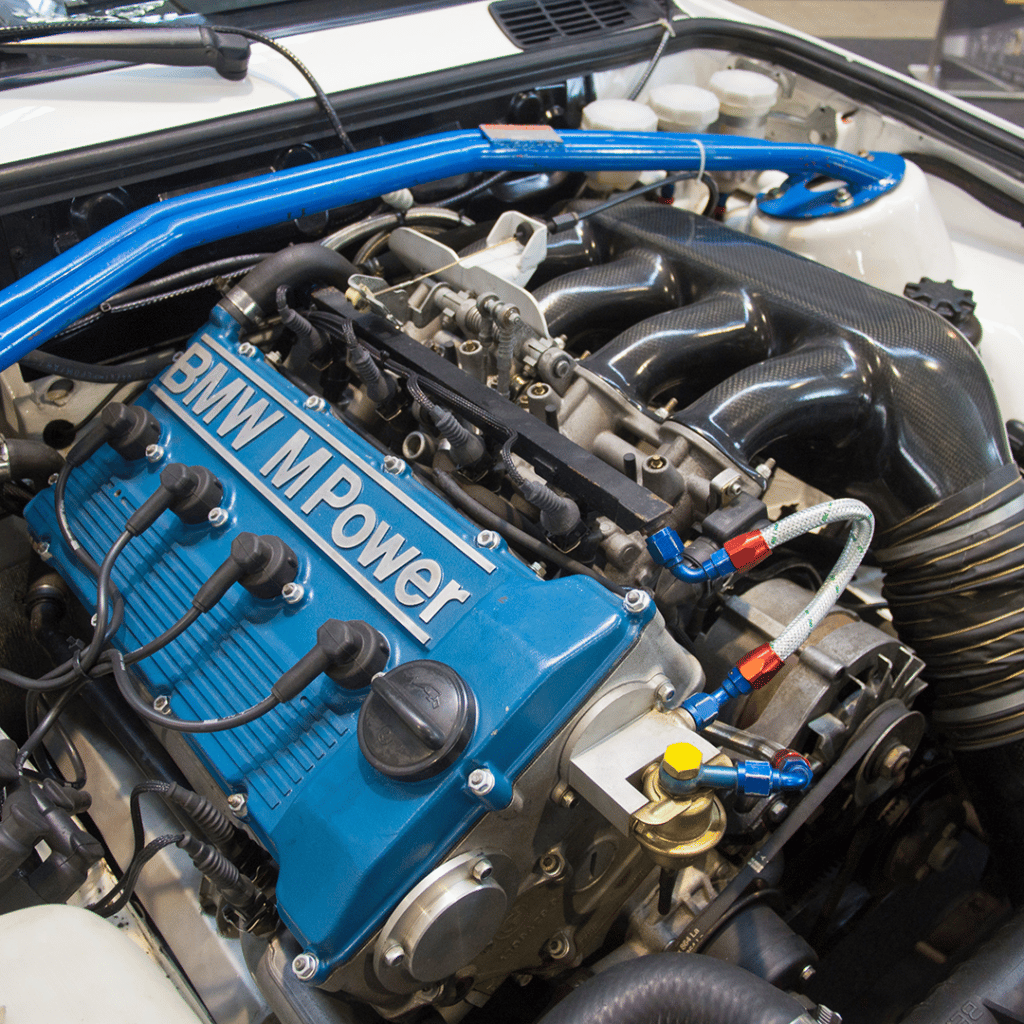
BMW TRAINING
We still participate in BMW factory training as well as independent classes. We have the latest BMW-specific diagnostic and repair equipment needed. We truly are your BMW dealer alternative. All the benefits of having a vehicle-specific trained technician plus the added bonus of dealing with a family-owned auto shop that treats you the way you deserve.

WE STAND APART
We have found that a lot of independent shops in our Layton, Kaysville, and South-Weber area are a little afraid of BMW diagnostics, repairs, and service. We believe this is simply due to a lack of knowledge and confidence in these makes. BMW does make a great vehicle. They are designed with a fun driver experience in mind. They are well-engineered and are very reliable vehicles, especially if you keep up with the maintenance.

BMW PARTS AND FLUIDS
BMWs typically require tools, equipment, parts, and fluids that are not commonly at a general auto repair shop. Once again we do have the specific tools and equipment needed to properly perform diagnostics, repairs, and service on your BMW. We also have great relationships with European-specific parts and fluid suppliers. This allows us to get the proper parts and supplies needed to do the job right on your vehicle and also allows us to offer a 3-year 100k mile warranty on any repair or service we provide. The Utah BMW dealer is still stuck in the past with a basic 12-month 12k mile warranty. Not only do our relationships with suppliers allow us to offer you an industry-leading warranty, but it also allows us to offer great turnaround times and fair pricing.

ENGINE REPAIRS- OIL CONSUMPTION
Another common concern that our BMW customers come in on is oil consumption. The engine packages in most BMW models are reliable and seldom need engine repairs or engine replacements. Most BMW engine packages utilize a crankcase vent system. This is a fairly complex system that controls the amount of vacuum your engine is creating. As your engine runs at idle it actually creates a negative pressure or vacuum. If that negative pressure (vacuum) becomes higher than BMW factory specifications, it will cause your engine to consume oil. Most BMW engines have a component called a crankcase vent valve. It is basically a vacuum diagram that makes adjustments to keep your engine vacuum at safe levels. If your car begins to consume oil, this is the component that is most likely the cause therefore we always check it first. If caught soon enough, this is a fairly easy diagnosis and repair. If left untreated for too long, it can cause very expensive repairs to not only the engine but can even cause damage to expensive emissions components. Keep an eye on your oil levels. As a general rule, if you are consuming more than one quart of oil in between oil changes, that is considered excessive. It is our recommendation to check a few things even if your engine is consuming ½ quart in between oil changes if the proper European specification synthetic oil is being used with a quality oil filter at each of your oil services.
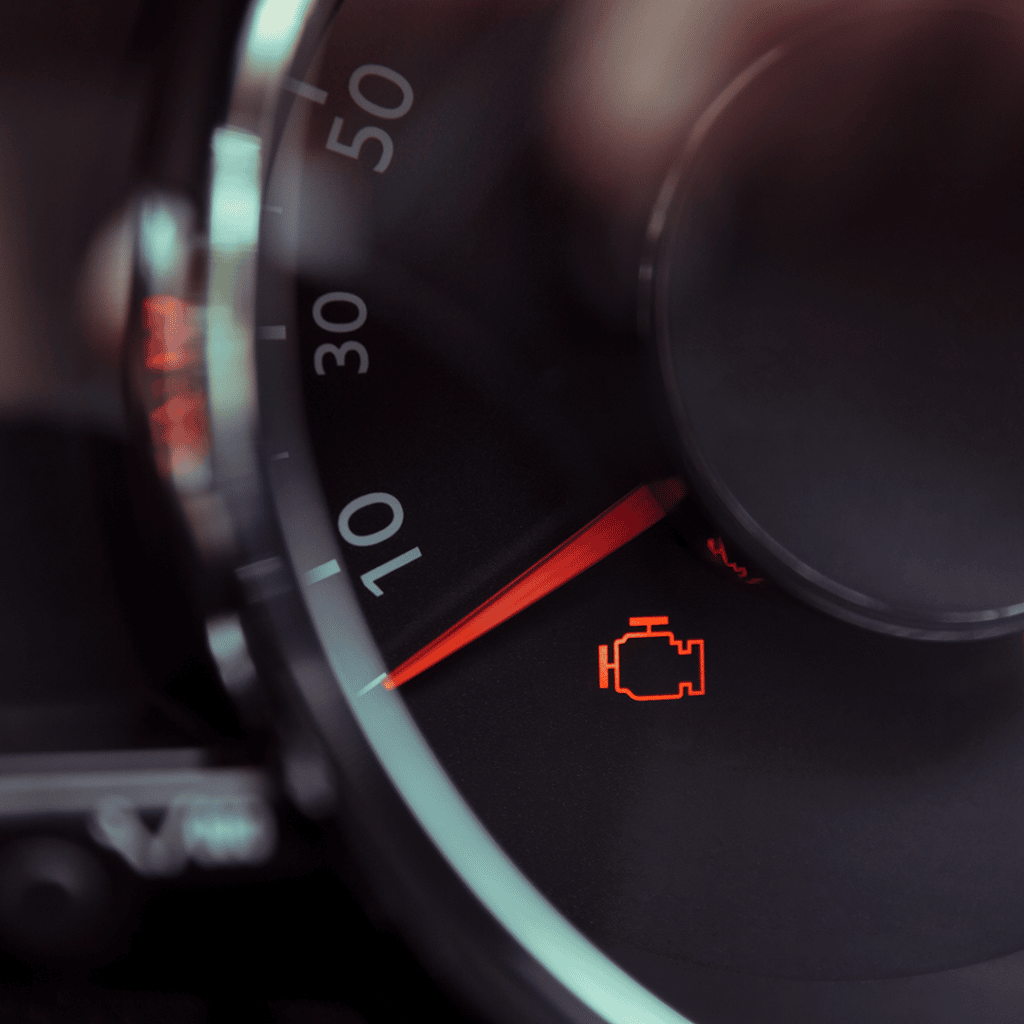
WARNING LIGHTS, ESPECIALLY CHECK ENGINE LIGHTS
Chances are that if you are currently searching for a BMW mechanic, you have some sort of warning light in your car’s message center. Warning lights, especially check engine lights are the most common phone calls we receive. If your check engine light is on solid, this means you should schedule your car in to be diagnosed by a BMW mechanic as soon as time allows. Preferably in the next few days. If your check engine light is flashing, this means you should pull over as soon as it is safe to and turn your vehicle off. The check engine light flashing is a warning that there is a malfunction severe enough to possibly cause damage to emissions components on your vehicle. We would advise calling your BMW mechanic before continuing to drive your vehicle. They will likely recommend sending a tow truck to pick you up to avoid any further damage.
OUR DIAGNOSTICS PROCESS
If your vehicle comes into our shop with the check engine light on, there is a regular process our mechanics will follow to diagnose the problem.
Step one – check vital fluids to ensure the vehicle is safe to drive.
Step two – is to perform a short test drive. During this test drive, the mechanic will be watching, listening, and feeling any abnormal concerns. Loss of power, noises, other warning lights, vibrations, etc.
Step Three – is to use our BMW factory scan tool to retrieve trouble codes. Whenever your check engine light comes on. Your vehicle’s computer system will store trouble codes that help us diagnose the source of the problem. These trouble codes typically consist of a combination of letters and numbers. The trouble codes do not tell the mechanic exactly what is wrong with your vehicle but it does give them good clues as to what areas they need to test.
Step four is to visually check the most common causes for obvious wear or damage.
Step five is to determine what tests need to be performed in order to be 100% confident in diagnosing the concern and how long it will take. This allows your service adviser to call and discuss costs for proper diagnostic procedures before moving forward.
Step 6, once approved by you, your BMW mechanic begins very specific testing using factory equipment, diagrams, and technical data to test all components in the system causing your check engine light. Keep in mind that once repairs have been done to fix the check engine light concern, your BMW mechanic will then clear the codes out of the memory of your computer. Your vehicle will then need to be driven for a few drive cycles to ensure the problem is fixed and no other problems are found. The drive cycle typically takes a couple of days as it involves several cold starts and multiple different driving situations and speeds
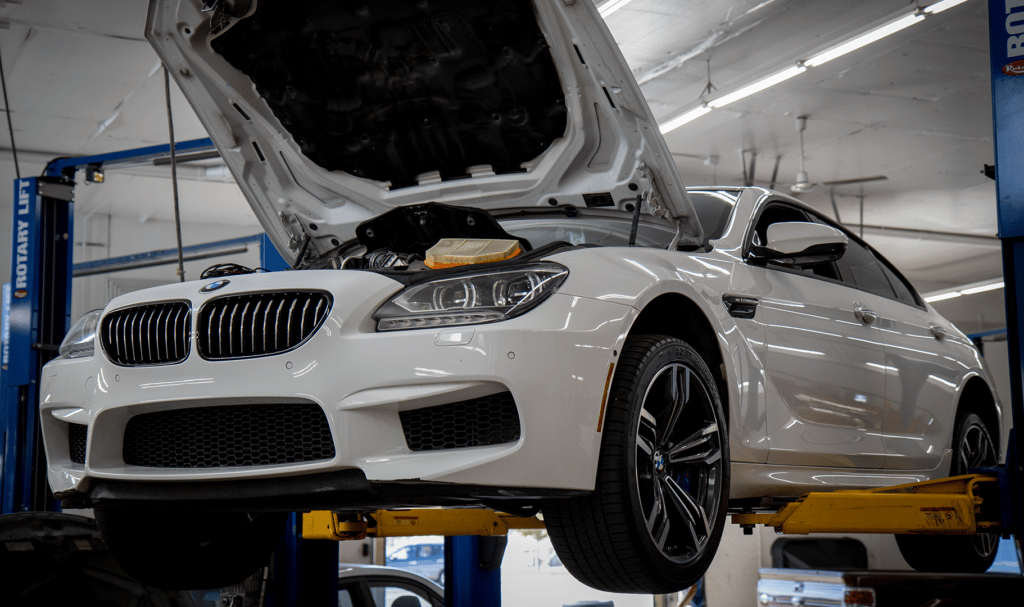
VIBRATIONS- STEERING & SUSPENSION REPAIRS
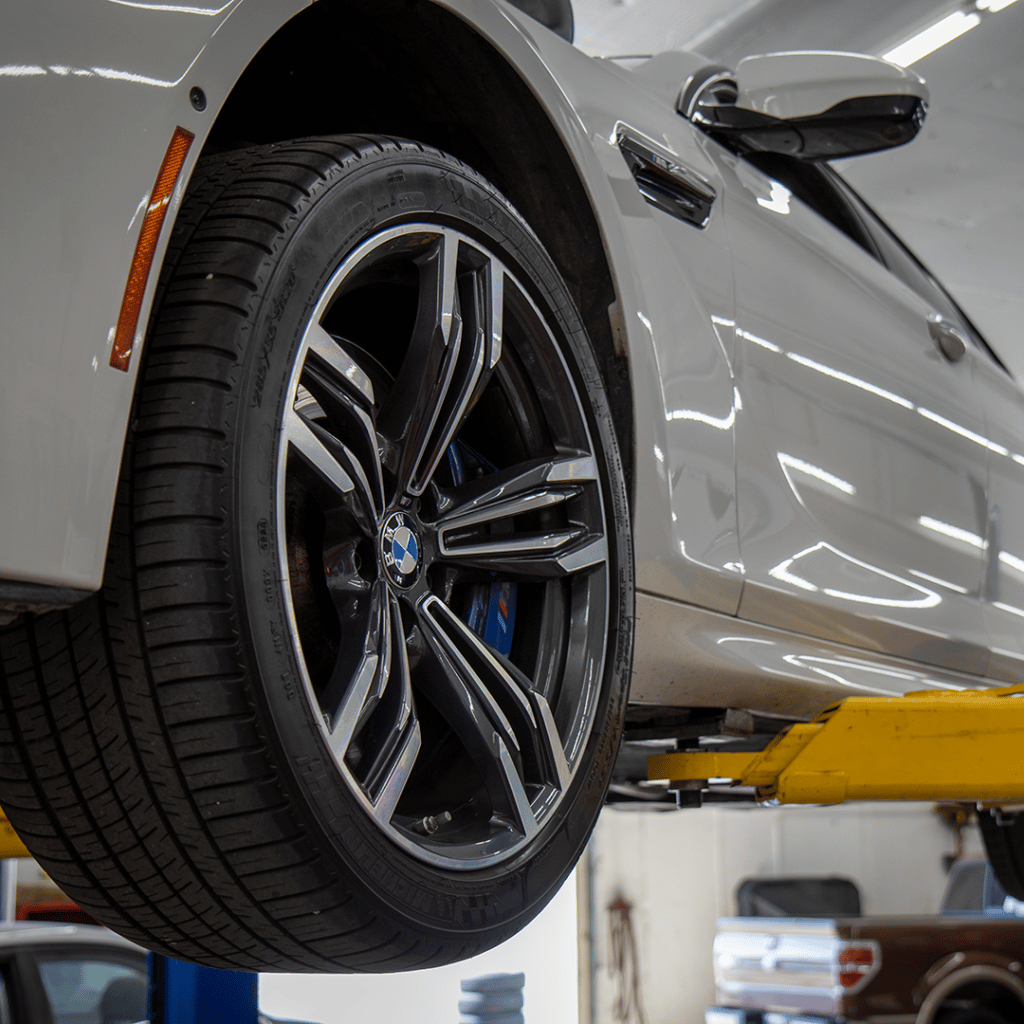
One of the biggest things that make your BMW handle better than 90% of other vehicles is the design of the steering and suspension systems. Once again, BMWs are designed to deliver a positive driving experience and a good part of that experience is the way a vehicle handles at higher speeds and when turning. BMW designers put thought into the type of struts, shocks, coils, control arms, steering racks, and all other steering and suspension parts when designing your vehicle. Another common concern our BMW customers have is vibrations at certain speeds or suspension noises.
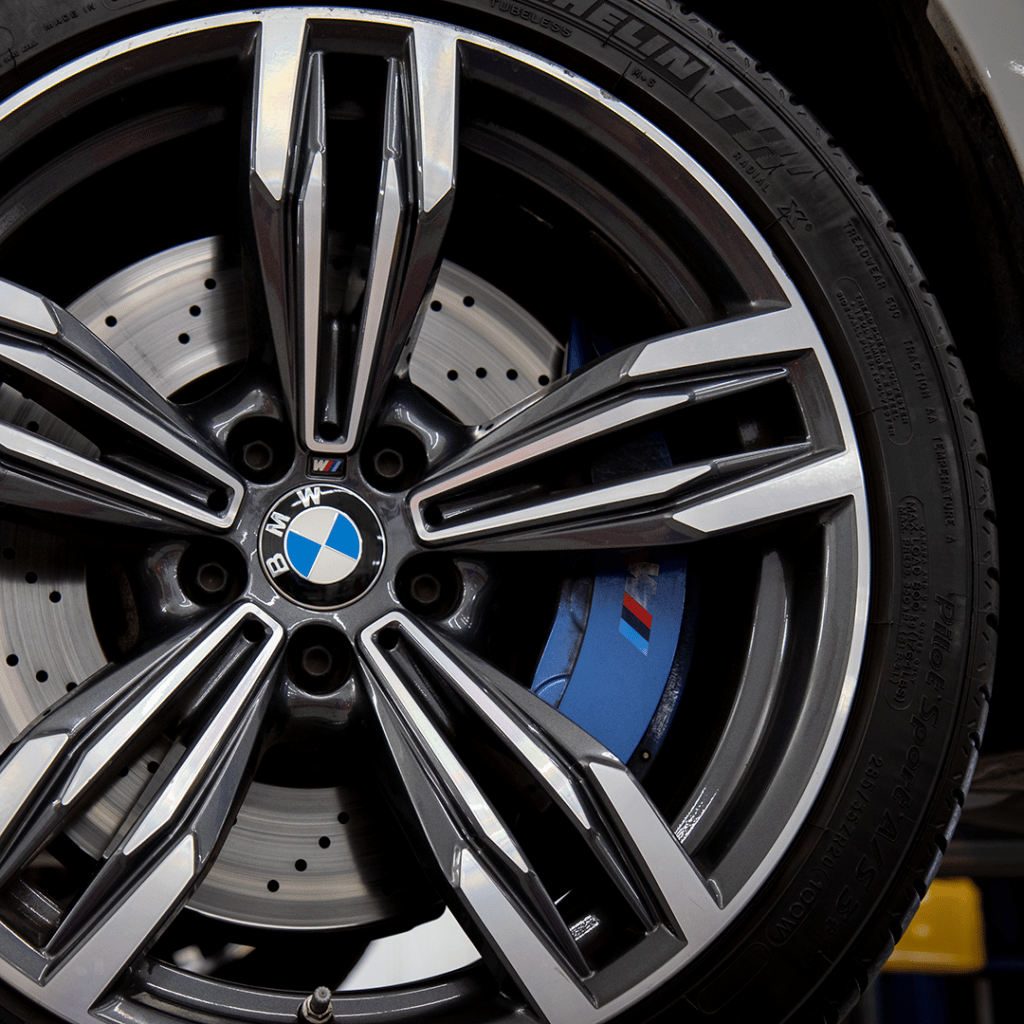
Most BMWs utilize a fairly low-profile tire. With the various road conditions here in Utah and especially here in our Layton, Kaysville, and South Weber areas, it is easy to have a tire become unbalanced. This is generally an easy repair. Remove all 4 wheels, spin on our tire balancing machine, and adjust weights as needed. During the tire balance, your BMW will be closely checking the tire and wheel to ensure there is not any damage requiring tire or wheel replacement. Suspension noises can often be easily diagnosed and repaired but sometimes they can be a little more difficult to find.

The most common suspension part to fail on BMWs is the control arm bushings. A control arm is an integral part of the suspension that moves up and down when going over variations in the road. They have bushings in the ends that mount to the car’s subframe. As these bushings age and wear, they can allow excessive play in the suspension causing noises, tire wear or even a loose feel in the steering and suspension. Often times the control arm bushings can be replaced but in some cases, it is best to replace the complete control arm.
SERVICING YOUR BMW
When it comes to servicing your BMW, it is important to take it to a BMW garage that has access and a good understanding of the manufacturer’s recommendations. There are many similarities between your BMW service procedures and general auto service procedures but there are also many differences. A BMW garage will know these differences.

Your engine calls for a European specification oil that is generally fully synthetic. The synthetic oils that a typical auto repair shop stocks are good oil but do not typically have the exact specifications required for your specific engine.
Transmission fluid is another fluid that has a completely different process to check levels and services. Your BMW transmission also requires a completely different transmission fluid than almost any other vehicle. If the garage was to service the transmission with the wrong transmission fluid or wrong transmission service procedure, it could cause early failure and an expensive repair.
Power steering fluid, brake fluid, coolant, and differential fluids are also different in most cases. My point is to be careful when selecting a BMW garage and BMW mechanic to service your vehicle.
BMW BRAKES
With your BMW being designed with performance and a fun driver’s experience in mind, it is also important for you to be able to stop properly. BMW brakes are well-designed and a bit different than domestic vehicles.
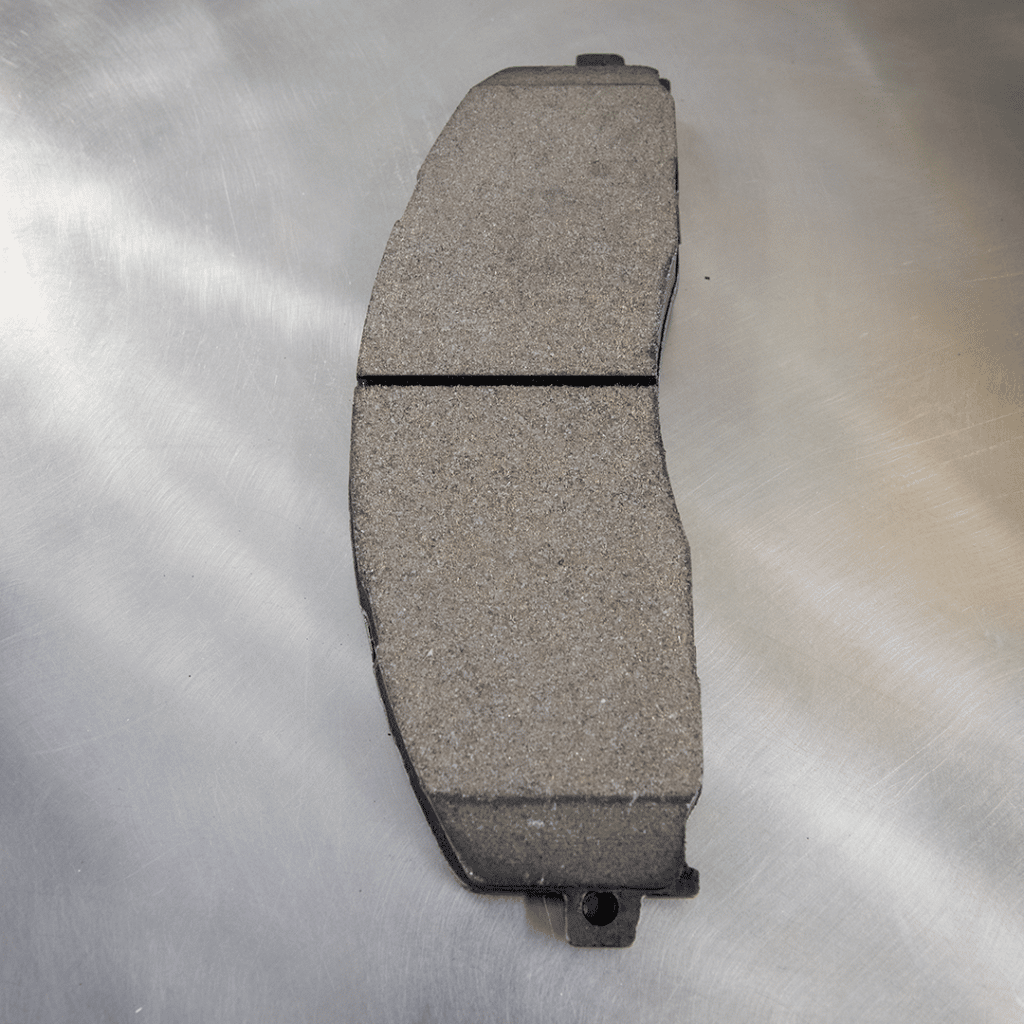
BMW PADS
In order to provide good brake stopping power, BMW typically outfits your vehicle with a large diameter brake rotor and two to four-piston brake calipers. The larger diameter brake rotor allows for more contact surface for brake pads. This leads to greater stopping power.
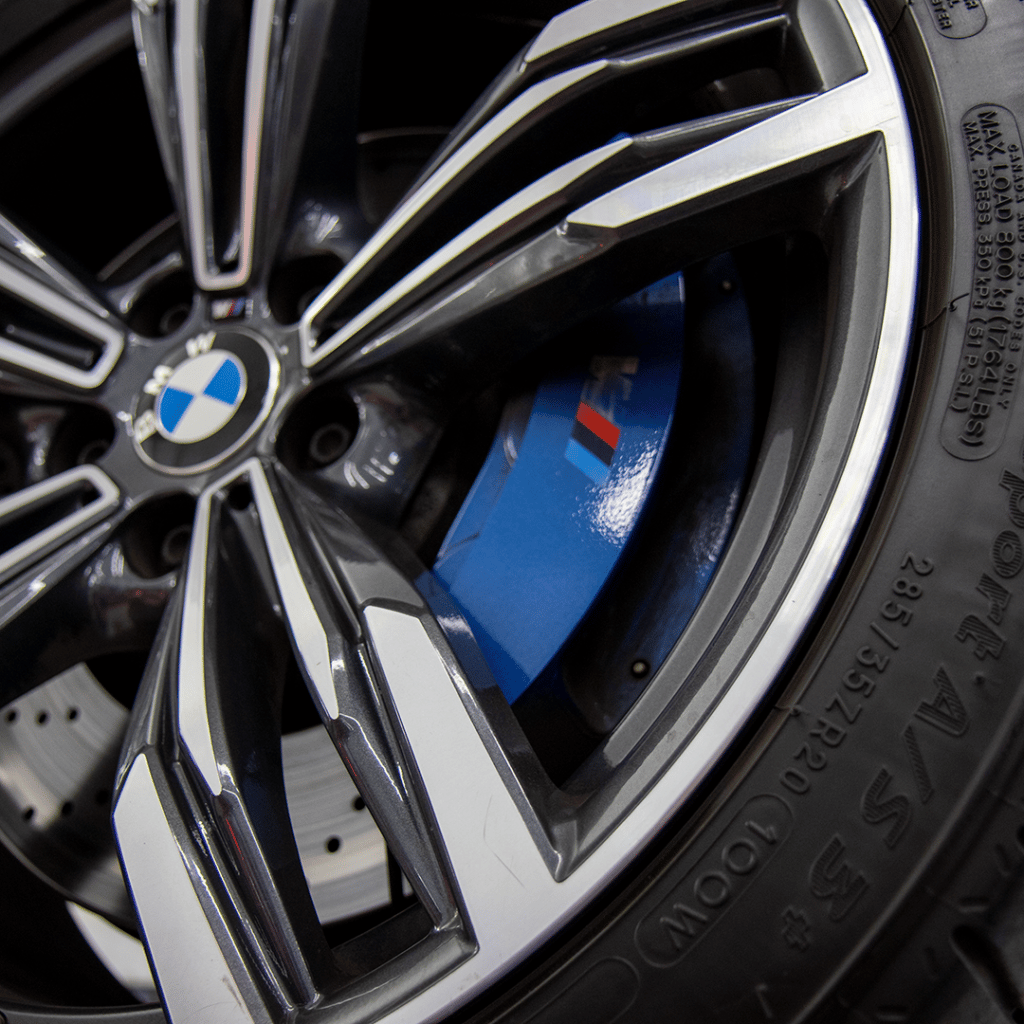
BMW CALIPERS
The brake calipers on a Brake system have two or four pistons allowing for the proper force to be supplied when you press the brake pedal.
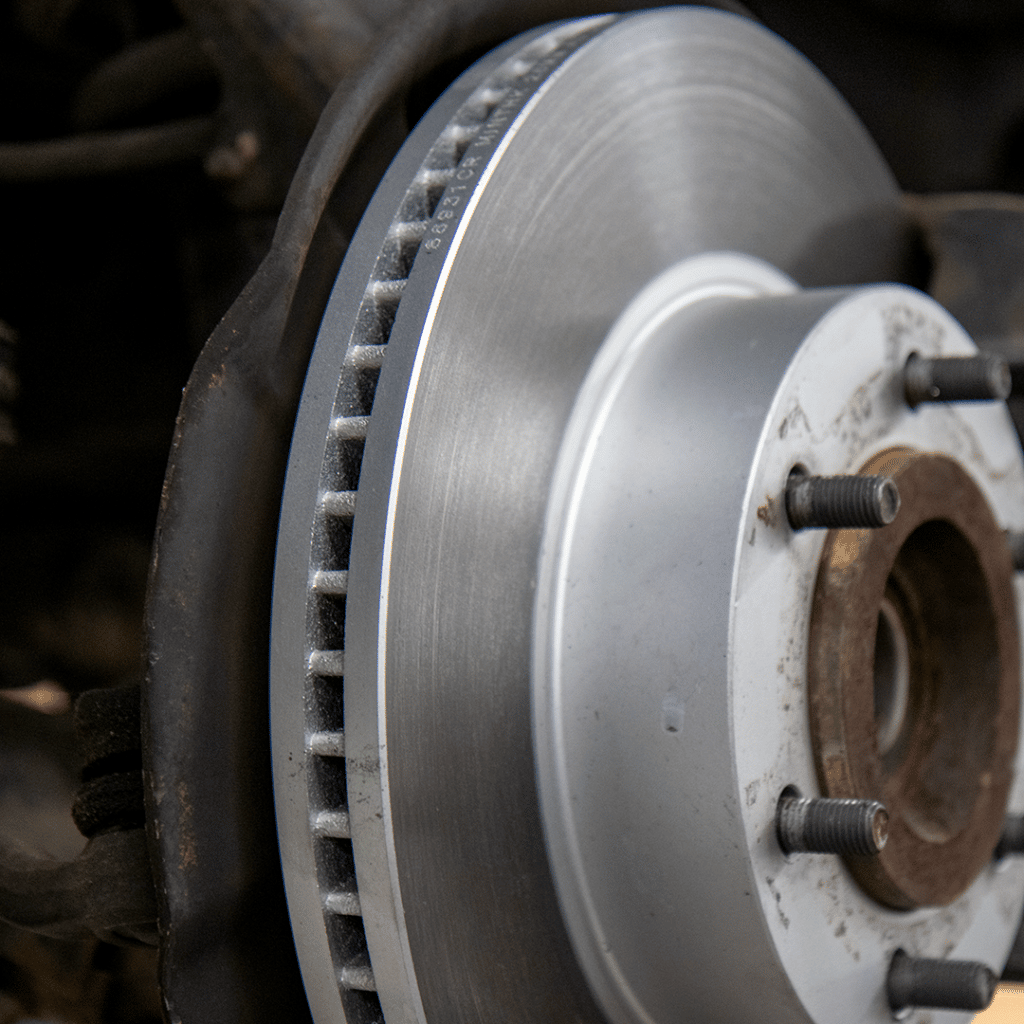
BMW ROTORS
Another unique thing about BMW brake rotors is the metal composition. The brake rotors are usually built with a somewhat soft material that actually allows the brake pads to wear down over time. This makes for good friction and reduces brake noise.
Now even the brake pads are manufacture specific on BMW brakes. They are typically ceramic brake pad material that is dust-free to help keep your wheels nice and clean. BMW brake pads also have a wear sensor in them that is important to replace during brake repairs or replacement. Failure to replace the brake pad wear sensor can lead to false warnings in your message center. Seeing as how our BMWs are already known for setting numerous warnings, we don’t need to cause any extra.
BMW IGNITION AND TUNE-UP
The ignition system on BMWs has become fairly basic. All current engine packages have gotten rid of distributors and spark plug wires. BMW engines now utilize a coil-over spark plug ignition system. The vehicle’s onboard computer utilizes signals from crankshaft sensors and camshaft sensors to determine when to send out the ignition signal. The ignition signal then travels to whichever ignition coil is set to ignite in the firing sequence. The ignition coil then ignites the spark plugs. The spark then creates the spark needed to ignite the fuel, air, and compression in your engine. Most BMW garages now recommend performing a tune-up every 100k miles. A BMW tune-up consists of Iridium spark plugs and then inspecting all the other ignition parts. It is also common to have to replace the ignition coil boots at the same time as the spark plugs. As the ignition coil boots age over time, they can become worn and create extra resistance. The extra resistance can lead to the failure of one or more ignition coils. Although ignition coil replacement is a fairly easy repair, the ignition coils themselves can be slightly expensive.
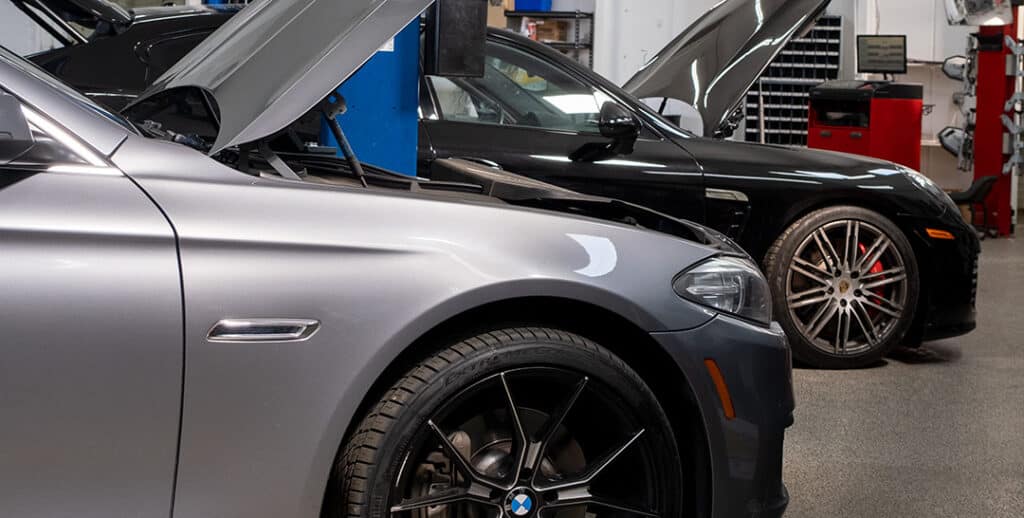
BMW FUEL SERVICE, REPAIRS, AND INJECTORS
We have found the fuel system on the late-model BMW to be fairly problem-free. There are a few models that have had some fuel injector failures around the 75k mile mark but the fuel pumps and other components seem to be doing really good. One of the best ways to keep the fuel system serviced and operating properly is to perform regular fuel system services. A complete fuel system service has three important parts.
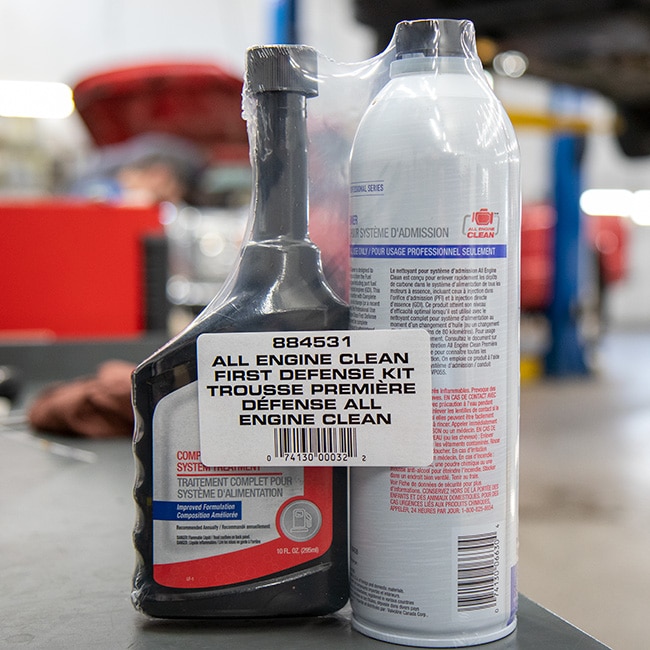
- The first part of a good fuel system service is just a simple additive for your fuel tank. You pour it into the tank so it can mix and dilute with a minimum of ¼ tank of fuel. This will help clean and treat the fuel pump, in-tank fuel filter, and fuel lines.
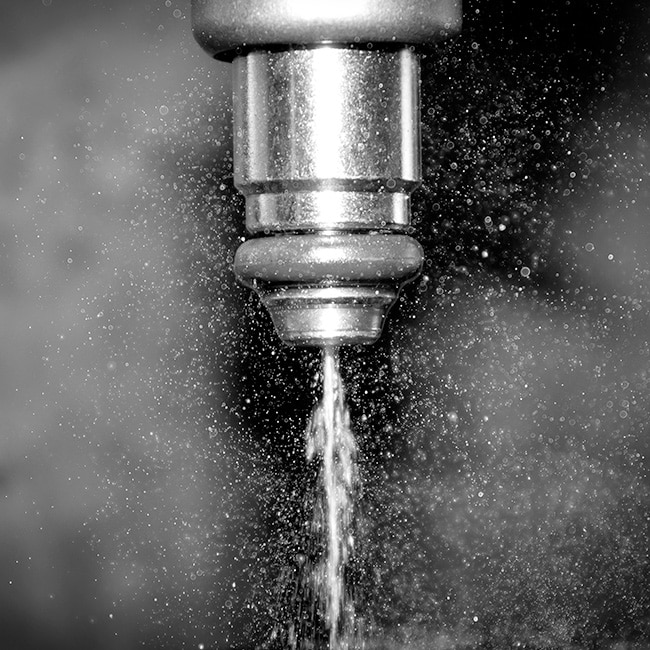
- The second part of a good fuel system service is to run a good cleaner directly at the fuel rail. This cleans the fuel rail and the fuel injectors. The spray nozzle on the fuel injector has very small orifices that are common to build up with fuel deposits and reduce performance. A clean fuel injector is important.

- The final step to a good fuel service is to run a cleaner through the air intake system. This cleans the mass airflow sensor, throttle body, and plate, upper intake manifold, and finally makes its way to the intake valves.
With newer BMW engine packages being highly efficient and low emissions, it is common for carbon buildup on valves. Excessive building causes a lack of performance or even misfires and checks engine light problems. It is our recommendation to perform a complete fuel service on your vehicle at 50k miles and then every 30k miles after that. This will dramatically lower the chance of your fuel injectors, fuel pump, or any other major fuel system components failing over the life of your vehicle.
Contact our shop in Layton, UT to schedule your BMW services today! We’d love to hear from you!
